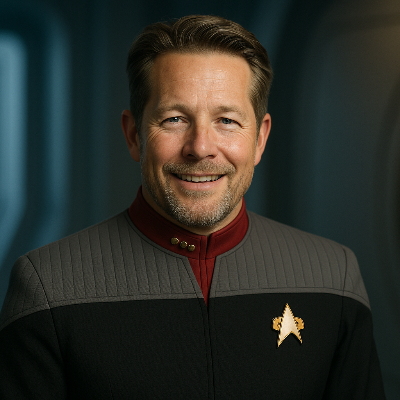
Adrian Locke
Human
he/him
Bournemouth, England, Earth
49
186
84
Blue
Dark blonde, streaked with grey
Adrian Locke grew up in Bournemouth during the latter half of the 24th century, in a family that valued both academic pursuit and service. His father was a civilian astrophysicist who worked with the Daystrom Institute on stellar cartography, while his mother served as a Federation diplomat. From an early age, Adrian was exposed to the twin ideals of discovery and diplomacy, shaping his dual interest in science and leadership.
He entered Starfleet Academy in 2349, showing strong aptitude in astrophysics, strategic operations, and command training. Unlike many of his peers, Locke was noted for his quiet determination rather than brash competitiveness. He excelled at making measured, deliberate decisions under pressure, a trait that earned him the trust of both instructors and fellow cadets.
Over a career spanning three decades, Locke served on multiple exploratory and tactical assignments. He became known as a bridge officer who could unify divided crews, balancing the drive of younger officers with the caution of experience. His career saw him both at the frontier of Federation expansion and in the aftermath of the Cardassian and Dominion conflicts, where he proved himself as a steadying influence during turbulent times.
By 2380, his record of service, diplomatic sensibilities, and calm under fire made him a natural candidate for a senior post aboard the USS Magellan (NCC-75308), the flagship of the Concordia Fleet.
2349–2353 – Cadet, Starfleet Academy (Command Track, with electives in Astrophysics)
2353–2356 – Ensign, USS Hathaway (Operations Officer, exploratory missions along the Federation coreward border)
2356–2363 – Lieutenant (jg), USS Arcturus (Science/Operations Officer, participated in Federation-Cardassian border patrols)
2363–2370 – Lieutenant, USS Cairo (Chief Science Officer; commended for crisis management during the Breen Incursion of 2366)
2370–2375 – Lieutenant Commander, USS Zephyr (Executive Officer; saw action in multiple theatres of the Dominion War)
2375–2380 – Commander, USS Zephyr (Promoted to Acting Captain in final year of service after the Captain’s reassignment; earned Starfleet Citation for Service in Conflict Recovery)
2380–Present – Diplomat, USS Magellan (Ross-class, Concordia Fleet flagship)
Adrian Locke has maintained a consistent level of fitness throughout his service. He has sustained the usual range of minor injuries associated with active duty — a fractured collarbone (2358), plasma burn scars (healed, 2374), and mild hearing loss in the left ear from a Jem’Hadar weapons discharge during the Dominion War (corrected surgically).
Currently, he maintains excellent cardiovascular health, though recent check-ups note elevated blood pressure, attributed more to stress than underlying condition. Starfleet Medical has cleared him for full active duty, recommending regular monitoring.
Locke is described by Starfleet Counseling as deliberate, disciplined, and resilient, with a natural inclination to listen before acting. He values order and clarity but has learned to adapt quickly when plans unravel.
His wartime experiences, particularly the losses endured during the Dominion War, have left him with a measured caution in combat situations. Counselors note that while he does not suffer from PTSD, he carries a quiet weight of responsibility for those lost under his command. This manifests as an occasional reluctance to risk junior officers, though he is aware of the tendency and actively works to balance it.
Socially, Locke is personable but private. He cultivates respect more than friendship with subordinates, though those who know him well regard him as fiercely loyal. He has an understated sense of humor, often surfacing at unexpected moments, which helps ease tension among his crews.
Starfleet Command values him as an officer who embodies stability, strategic foresight, and integrity — qualities seen as vital to the Magellan’s mission of exploration, diplomacy, and unity in the post-war era.